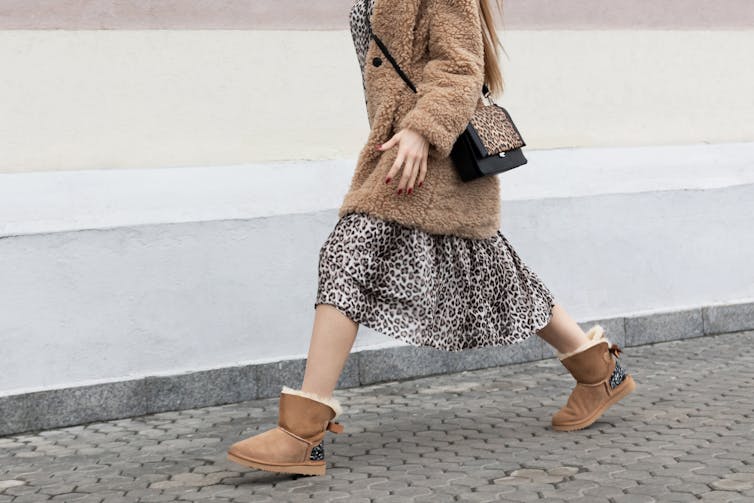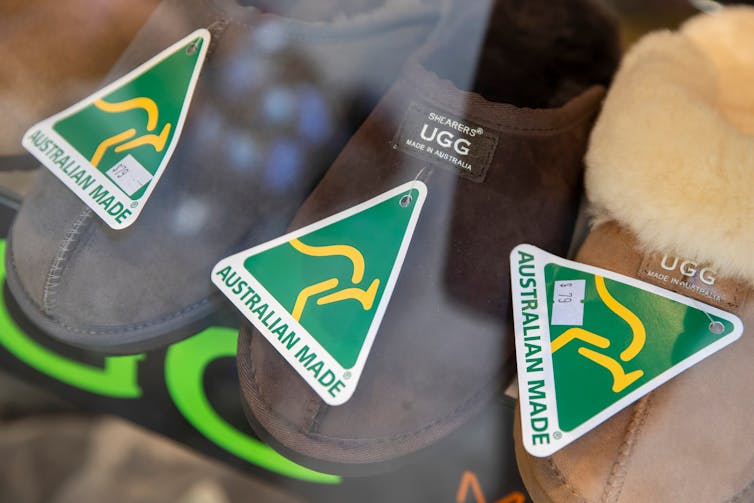Australian-owned brand UGG Since 1974 has announced it will change its name to “Since 74” for sales outside Australia and New Zealand.
There has been a long-running battle over the rights to use the name “ugg” to sell the iconic sheepskin boots worldwide.
This latest development follows years of legal challenges between small Australian manufacturers and American footwear giant Deckers Brands.
While courts in the United States have ruled “ugg” can be used by brands in Australia and New Zealand, where it has become a generic name for sheepskin boots, Deckers own the rights to use ugg internationally. They are now pursuing UGG Since 1974 for using the name.
UGG Since 1974 is an established maker of the boots, predating establishment of the Deckers brand. But locally, uggs are made – and advertised as uggs – by many small Australian manufacturers.
The origins of uggs
Ugg boots are widely understood to have been invented in Australia.
They made their first documented appearances on surfers’ feet in the 1950s.
By the 1970s, they were commonplace across Australia. In 1981, ug (with one “g”) made its way into the Macquarie Dictionary as a generic term for sheepskin boots.
Over the years, they have become an internationally recognised Australian icon.
In late 1970s, Australian entrepreneur Brian Smith took the style to California before registering the name as a brand in the United States.
Deckers later bought the rights from Smith and trademarked it as “UGG Australia” in 1995. The company has since dropped the “Australia”, and has aggressively pursued Australian makers who attempt to use the term “ugg” when selling overseas.
What’s in a (brand) name?
In a successful 2019 infringement case against Australian manufacturer Eddie Oygur, Deckers argued Americans did not recognise “ugg” as a descriptive term but only as a brand name.
When a brand name enters everyday language as a generic term, companies often fight hard to protect their trademark rights. A trademark can lose its protection when the name becomes generic. Examples include thermos, aspirin and sellotape, which were once protected brand names but became general terms.

The lengths brands will go to prevent their trademarks becoming generic can be quite extreme. A notable example is French fashion house Chanel, which took out a full-page advertisement in Women’s Wear Daily in 2010 that threatened legal action against journalists who used terms like “Chanel-issime, Chanel-ed, Chanels, and Chanel-ized” to describe other designers’ work.
The image of a brand
What makes Deckers’ aggressive trademark defence particularly interesting is that they are claiming global trademark rights over a term that was already generic in its country of origin. This has caused some to question whether the rights should have been granted in the first place.
Their actions against smaller Australian brands also appear to contradict their carefully cultivated brand image.
The company’s website and code of ethics promote values like authenticity and cultural engagement, stating they exist to “positively impact the world by uniting purposeful brands with diverse people”.
In many senses Deckers do maintain impressive standards of corporate social responsibility and hold themselves to high standards. Yet here they are attempting to monopolise a term that has become deeply embedded in Australian culture.

The company’s actions have sparked significant backlash, with the UGG Since 1974’s TikTok announcement receiving 1.1 million likes and 79,000 shares in only two days. Social media users have said they will now be boycotting Deckers Brands in favour of Australian makers.
The controversy highlights a growing tension between intellectual property rights and cultural sustainability. While environmental sustainability is becoming a priority for brands and the media, cultural sustainability – which includes preserving heritage, cultural diversity and local practices – often takes a back seat.
Cultural legacy
For Todd Watts, grandson of UGG Since 1974’s founders, the decision to rebrand as “Since 74” outside Australia represents both a legal necessity and a statement of authenticity.
His company continues to handcraft boots in Australia using local materials and labour, maintaining a tradition that predates Deckers’ involvement with the product by decades.
And even if they will no longer be called “UGG Since 74”, it is likely the use of ugg as a generic name will stick.
While Deckers won the legal right to the ugg name, Australian manufacturers like Watts continue to defend their cultural legitimacy through local production and connection to the product’s heritage.
Alexandra Sherlock does not work for, consult, own shares in or receive funding from any company or organisation that would benefit from this article, and has disclosed no relevant affiliations beyond their academic appointment.
This article was originally published on The Conversation. Read the original article.







